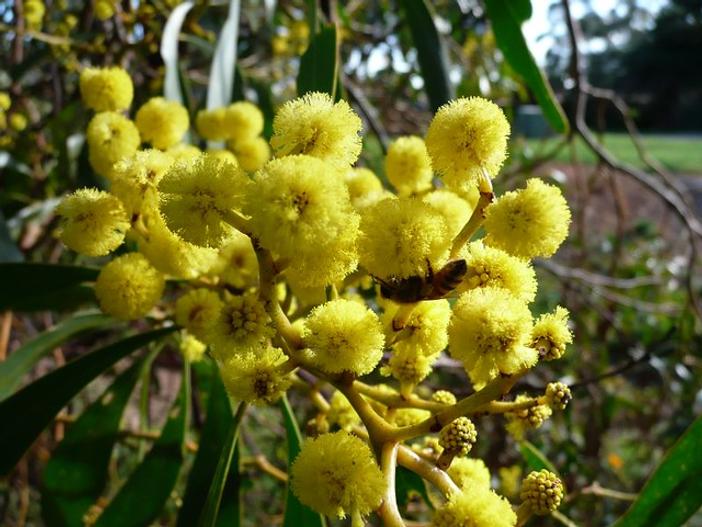Golden Wattle
(Acacia pycnantha)
Golden Wattle (Acacia pycnantha)
/
/

Sydney Oats
CC BY 2.0
Image By:
Sydney Oats
Recorded By:
Copyright:
CC BY 2.0
Copyright Notice:
Photo by: Sydney Oats | License Type: CC BY 2.0 | License URL: https://creativecommons.org/licenses/by/2.0/ | Uploader: expom2uk | Publisher: Flickr
































































Estimated Native Range
Summary
Acacia pycnantha, commonly known as Golden Wattle, is an evergreen shrub or small tree native to open woodlands and forest edges in Southeastern Australia. It typically grows to a height of 8 meters (26 feet) with a spreading habit. The Golden Wattle is renowned for its vibrant, fluffy, golden-yellow flowers that bloom in late winter to spring, creating a spectacular display. These flowers are highly attractive to pollinators and are followed by elongated seed pods. The plant’s foliage is also noteworthy, with blue-green phyllodes (leaf-like structures) that add to its ornamental value.
The Golden Wattle is valued for its bright yellow, fragrant flowers and is often used in gardens and landscapes as a feature plant, for screening, or as a windbreak. It is also employed in erosion control due to its fast growth and spreading root system. This species is relatively short-lived, with a lifespan of 15 to 30 years, but it compensates with rapid growth. It is frost-tolerant to a degree and can adapt to a variety of soil types, though it thrives in well-drained conditions. It is drought-resistant, requiring winter rainfall between 370–550 mm (10–20 in) for optimal growth. In cultivation, it does best in full sun to part shade and can tolerate low to medium water availability. While it can handle heavy soils in dry climates and mild soil salinity, it may experience chlorosis in alkaline soils. Gall attack is a potential problem in cultivation. Propagation is typically from seed, which requires pre-soaking in hot water to break the hard seed coat.CC BY-SA 4.0
The Golden Wattle is valued for its bright yellow, fragrant flowers and is often used in gardens and landscapes as a feature plant, for screening, or as a windbreak. It is also employed in erosion control due to its fast growth and spreading root system. This species is relatively short-lived, with a lifespan of 15 to 30 years, but it compensates with rapid growth. It is frost-tolerant to a degree and can adapt to a variety of soil types, though it thrives in well-drained conditions. It is drought-resistant, requiring winter rainfall between 370–550 mm (10–20 in) for optimal growth. In cultivation, it does best in full sun to part shade and can tolerate low to medium water availability. While it can handle heavy soils in dry climates and mild soil salinity, it may experience chlorosis in alkaline soils. Gall attack is a potential problem in cultivation. Propagation is typically from seed, which requires pre-soaking in hot water to break the hard seed coat.CC BY-SA 4.0
Plant Description
- Plant Type: Tree, Shrub
- Height: 18-27 feet
- Width: 9-12 feet
- Growth Rate: Rapid
- Flower Color: Yellow
- Flowering Season: Winter, Spring
- Leaf Retention: Evergreen
Growth Requirements
- Sun: Full Sun, Part Shade
- Water: Low, Medium
- Drainage: Medium
Common Uses
Bee Garden, Bird Garden, Drought Tolerant, Erosion Control, Hummingbird Garden, Low Maintenance, Showy Flowers, Street Planting
Natural Habitat
Open woodlands and forest edges in Southeastern Australia
Other Names
Common Names: Australian Golden Wattle, South Australian Golden Wattle, Broadleaf Wattle, Gouewattel, Goldakazie, Acacia Doré
Scientific Names: , Acacia pycnantha, Acacia petiolaris, Acacia falcinella, Acacia pycnantha var. petiolaris, Acacia westonii, Racosperma pycnanthum,
GBIF Accepted Name: Acacia pycnantha Benth.